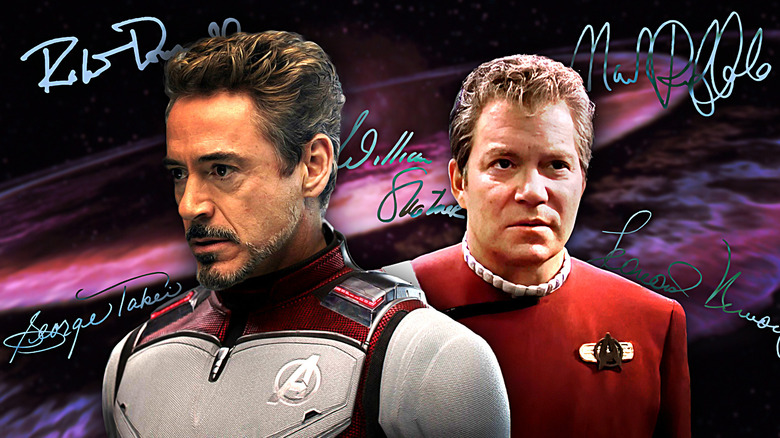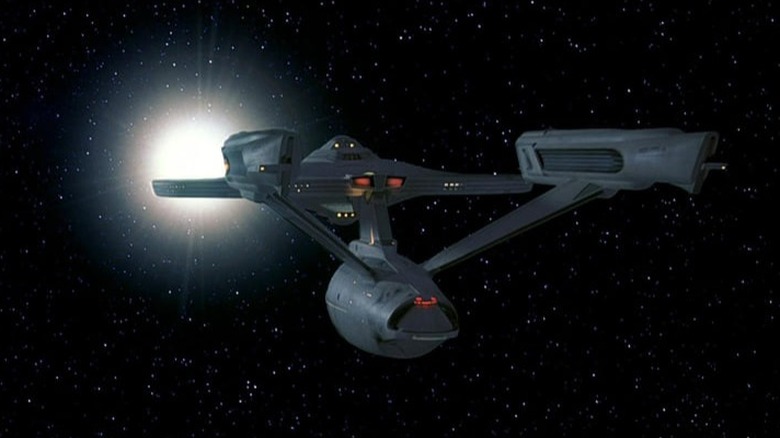Marvel Swiped Its Avengers: Endgame Credits Idea From A Star Trek Movie
Honestly, it's amazing that the original "Star Trek" cast managed to do six movies together. The Enterprise crew were already middle-aged when they first reassembled in 1979 for "Star Trek: The Motion Picture." Then the 1982 sequel "The Wrath of Khan" made it text that Captain Kirk didn't feel as young as he used to. Yet they all kept returning for nine more years.
They didn't quite make it to "Star Trek XII: So Very Tired," but they got halfway there. "Star Trek VI: The Undiscovered Country" was definitely not the ending of all "Trek," but it was for the original cast. It was conceived that way, hence the ending where the Enterprise is set for decommission and Jim Kirk, in his final captain's log, says it's time for the next generation to have its moment in the sun.
Since making this film capped off a journey that began in 1966, the cast did a special commemoration. After Kirk's last log and before the credits proper begin, the cast's signatures appear, one-by-one across the frame, effectively signing off of "Star Trek."
28 years later, Marvel Studios pulled this same trick for "Avengers: Endgame." The film's main ensemble were credited one-by-one, their names placed in front of clips of them in previous Marvel movies. The original six Avengers actors (Jeremy Renner, Scarlett Johansson, Mark Ruffalo, Chris Hemsworth, Chris Evans, and Robert Downey Jr.) got special treatment; their signatures formed on screen and stood beside the typographic text.
They'd only been playing the Avengers for 10-ish years, not 25 like the "Star Trek" cast, but still, that's an impressive run. If you stay in any job for that long, then the departure will feel like a life-shifting event.
So, "Endgame" or "Undiscovered Country" — which is the better franchise finale?
The Undiscovered Country gave Star Trek the ending it deserved
"Star Trek: The Undiscovered Country" is when the Federation and the Klingons finally negotiate peace. It turns out these savage but honorable aliens do like at least one human — William Shakespeare. Klingon Chancellor Gorkon (David Warner) nicks the Bard's turn of phrase from "Hamlet" but flips it. To Gorkon, the "undiscovered country" is not death, but the future.
Many "Star Trek" episodes use Shakespeare lines as titles."The Undiscovered Country" brings that tradition to the films, and the line used is a perfect choice. It's a title that evokes exploration, the same emotions felt when you hear "the final frontier," and which reflects how forward looking a send-off the sixth "Star Trek" film is. This crew's mission is over, but the mission is not. It'll just be other explorers carrying it onward.
How does "Avengers: Endgame" compare in wrapping up the story of one generation, and setting the stage for another? The film took influence from a different "Star Trek" event; "All Good Things..." the time-hopping series finale of "The Next Generation." As Captain Picard (Patrick Stewart) flashes across different timelines in that finale, the Avengers in "Endgame" plot a "time heist" to revisit the events of previous MCU films.
Despite how infamous Marvel Studios is for often turning their films into trailers for the next ones, "Endgame" ends on the right note. It wisely chooses to leave the future vague, instead fading out with the ending of Captain America/Steve Rogers' (Chris Evans) arc. A man out of time, Steve travels back and finally gets to live the life he should've had with his beloved Peggy Carter (Hayley Atwell).
If anything, "Endgame" was too definitive an ending. If there's one reason for Marvel Studios' decline since 2019, it's because after "Endgame," they lost the drive and glue of the earlier films. Maybe they should take another cue from "Star Trek" and let beloved endings stand, without dragging actors back out until they're 90.

